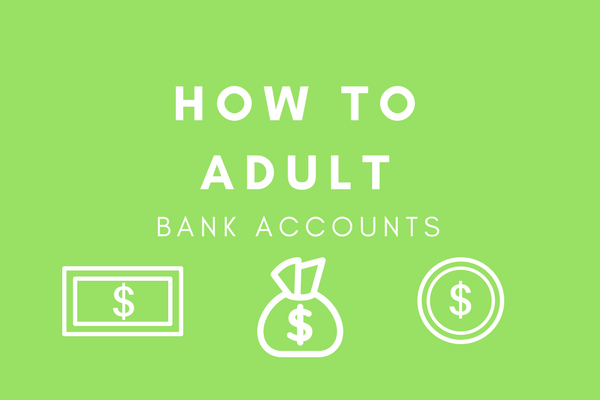
Make sure your money is in the right hands with this handy how-to.
How to Adult: Bank Accounts
Banks can often be a daunting insight into adult responsibilities, but the first step to conquering your bank account involves understanding the basics.
Checking Accounts
Odds are, if you have a job, you also have a checking account. This account allows you to deposit checks, make withdrawals and pay for day-to-day expenses. People usually hold the majority of their money in this account since it’s where transactions such as paying for bill occurs.
The accounts balance can be accessed through your debit card which simulates the transfer of money without physical cash. Since banks do not restrict the accounts accessibility, you can withdraw money as often as desired as long as purchases do not exceed the account’s balance. If you do spend more money than you have, extra fees will be administered. Despite the lack of restrictions through payments, there may be a limit on how often withdraws from an ATM can be made, but it varies depending on your bank’s policy.
Most people with checking accounts balance their account. This means they track all of their expenses in a spreadsheet, or even a checkbook, to keep an eye on their account. To balance your account,’ add all expenses and withdraws then subtracting any deposits. Your concluding solution should be zero. If it isn’t, after looking for any error you made, contact your bank to find the problem.
Savings Accounts
A savings account does exactly what you would expect it to do: it saves your money. The accounts accumulate a lot of money easily without sacrificing your whole paycheck for retirement, college or even just a rainy day.
Savings accounts are an investment. Any amount in the account exceeding the minimum balance will increase monthly through an interest rate. An interest rate can be considered as a reward from your bank that accrues the money in your account through factoring how much and how long the money sits. A starting interest rate varies depending on which bank you open the account with and its annual increase. Some banks might also have a fee involved with any withdraws to the account.
Credit Cards
A credit card allows you to borrow your bank’s money. In theory, a card that lets you pay for things with money you don’t have seems like a great idea. Unfortunately, that naivety often gives way to adults struggling with a lot of debt.
Banks typically require the credit card to be paid for within 25-30 days of the purchase. Every bank has a different time limit, but after you exceed that limit, interest adds on top of how much your purchase was. Interest adds up the longer you don’t pay it and ruins your credit score which makes buying a house or a car more difficult.
How to Open a Bank Account
When applying for a bank account, consider your current finances to determine what account you want. There are an endless number of accounts banks offer. You just have to find one that aligns with your needs. Then you need to research the bank you want to open the account with. Banks, much like any other business, have different products and policies. Make sure to look at extra fees that your bank could charge, like their policy on ATM fees. If you don’t want to open a bank account, look into Credit Unions. Credit Unions function like banks, but works for non-profit unlike banks. Because they’re not looking for a profit, some of the extra fees that banks have will not be present in Credit Unions. Conduct research to find what works best for your current lifestyle and will allow you to expand into new accounts as financial needs arise.
Now that you know what type of account you’re opening and where, fill out all the paperwork. Most banks have applications online that you fill out before arriving at the bank. An appointment will then be set to open the account. Despite variety among banks, you will usually need to present two different kinds of ID’s. Be prepared to bring a driver’s license, social security card, birth certificate, proof of residency and a beginning deposit.
Managing money can overwhelm, but it’s a part of life as an adult. If you ever find yourself confused, ask questions. Don’t take shame in consulting someone older and wiser.